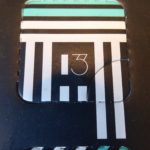 As we enter the second half of Ginvent, today we are trying the Elephant strength version of Elephant gin. what is Elephant strength you ask? Well, it’s 57% navy strength. But Elephant gin have a theme going on… I’ve been able to try a special edition Elephant gin through Craft Gin Club (here) and their Sloe gin (here) so I’m excited to see how this one compares. Continue reading
As we enter the second half of Ginvent, today we are trying the Elephant strength version of Elephant gin. what is Elephant strength you ask? Well, it’s 57% navy strength. But Elephant gin have a theme going on… I’ve been able to try a special edition Elephant gin through Craft Gin Club (here) and their Sloe gin (here) so I’m excited to see how this one compares. Continue reading
elephant gin
Ginvent 2016 – Elephant Sloe Gin
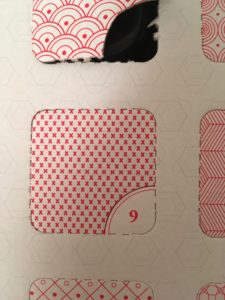
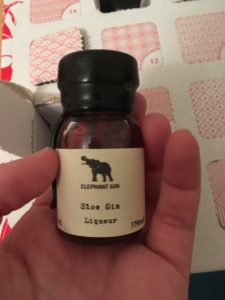 It’s day 9 and we’ve hit another gin I’ve already tried (there’s only about four in the whole of Ginvent) – it’s Elephant Sloe gin! I got this as a sample with my Craft Gin Club delivery a few months back and it is lush. Rather than entirely repeat myself you can check out the full taster here.
It’s day 9 and we’ve hit another gin I’ve already tried (there’s only about four in the whole of Ginvent) – it’s Elephant Sloe gin! I got this as a sample with my Craft Gin Club delivery a few months back and it is lush. Rather than entirely repeat myself you can check out the full taster here.
Catch up on Ginvent here.
Elephant Sloe Gin
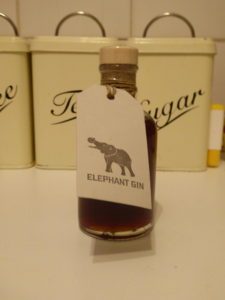 I got my sloe gin with my Elephant gin – bloody love this month’s Craft Gin Club delivery. After the joy that is Elephant gin (and you can read more about that here), I’m excited to try their sloe gin. After ripping off the plastic wrapping (thank god for long nails) I unpop the cork and the smell is sweet and syrupy. A slight sourness comes through so the smell isn’t overwhelming. Slightly Christmassy.
I got my sloe gin with my Elephant gin – bloody love this month’s Craft Gin Club delivery. After the joy that is Elephant gin (and you can read more about that here), I’m excited to try their sloe gin. After ripping off the plastic wrapping (thank god for long nails) I unpop the cork and the smell is sweet and syrupy. A slight sourness comes through so the smell isn’t overwhelming. Slightly Christmassy. 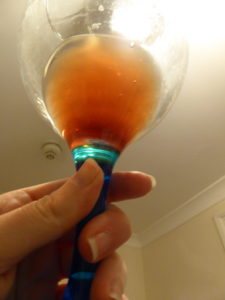 Initially dark in colour, when held up to the light it’s a rich amber.
Initially dark in colour, when held up to the light it’s a rich amber.
In the glass the juniper smell is strong, then I notice the label says “compared with other sloe gins, relatively low sugar content paired with higher alcohol volume” – it’s 35% which is higher than the average 15-30% (although EU laws say it must be a minimum of 25%). 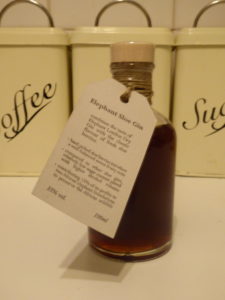 On the tongue when straight it’s very syrupy and sweet, with a strong kick of gin. Mixed with a touch of water it mellows out and produces a rich berry flavour. The juniper isn’t strong when you drink it, tasting slightly more of Chambord as a fruity mixer. Watered down slightly it doesn’t even have a taste of alcohol about it, but I am now obsessed with the idea of it being Christmas.
On the tongue when straight it’s very syrupy and sweet, with a strong kick of gin. Mixed with a touch of water it mellows out and produces a rich berry flavour. The juniper isn’t strong when you drink it, tasting slightly more of Chambord as a fruity mixer. Watered down slightly it doesn’t even have a taste of alcohol about it, but I am now obsessed with the idea of it being Christmas.
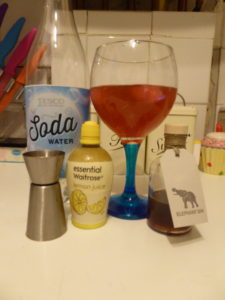 I don’t usually drink sloe gin with tonic, so instead I’m mixing it into a sloe gin fizz (one of my favourite cocktails in case you’re wondering). 50ml of sloe gin, 25 ml of lemon juice, a teaspoon of caster sugar and topped up with soda water. Nom nom. It’s soft and gentle, the flavours don’t overpowering anything else in the cocktail. Admittedly the recipe I followed called for an extra shot of gin, and perhaps this would have given it that little extra punch it perhaps needs (for my taste buds anyway). The bitterness of the gin and lemon juice is perfectly balanced with the sweetness from the sugar. Perfectly quaffable. I love sloe gin.
I don’t usually drink sloe gin with tonic, so instead I’m mixing it into a sloe gin fizz (one of my favourite cocktails in case you’re wondering). 50ml of sloe gin, 25 ml of lemon juice, a teaspoon of caster sugar and topped up with soda water. Nom nom. It’s soft and gentle, the flavours don’t overpowering anything else in the cocktail. Admittedly the recipe I followed called for an extra shot of gin, and perhaps this would have given it that little extra punch it perhaps needs (for my taste buds anyway). The bitterness of the gin and lemon juice is perfectly balanced with the sweetness from the sugar. Perfectly quaffable. I love sloe gin. 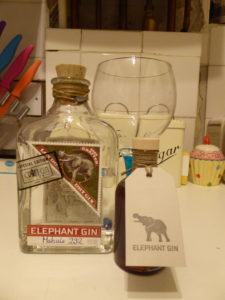
A 50cl bottle of Elephant Sloe gin is £31.95 on Masters of Malt (at time of publishing). I’d invest, now the winter and the dark nights are drawing in
Elephant Gin
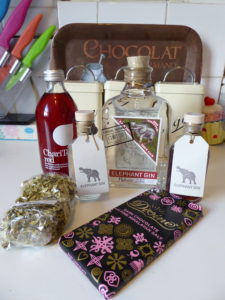 After a bit of a kerfuffle with Royal Mail and their tracking system, my September Craft Gin Club delivery finally arrived. I’ve seen Elephant Gin around a few places but I’ve not yet had a chance to try it, so imagine my excitement when I open my box to find a full size bottle of an exclusive batch, PLUS small bottles of the regular gin and sloe gin (reviews of these to come after my holiday as I’ve run out of time). We were also lucky enough to receive ChariTea Red, Divine‘s newest flavour – dark chocolate and pink Himalayan salt – and a bag of Buchu (literally no idea). 15% of Elephant Gin’s profits go to help elephant conservation through Big Life Foundation‘s Ranger Club and Space for Elephants Foundation and all products in this box are fair trade, so I can feel totally good at spending this months subscription cost. Each batch of Elephant Gin is named after a real elephant that is either being protected or has played an important role in Africa’s history. Mshale, my bottle’s namesake, is a 40 year old elephant living in Kenya’s Tsavo National Park – one of the largest with tusks weighing 100 pounds each (aka £25,000 worth of ivory).
After a bit of a kerfuffle with Royal Mail and their tracking system, my September Craft Gin Club delivery finally arrived. I’ve seen Elephant Gin around a few places but I’ve not yet had a chance to try it, so imagine my excitement when I open my box to find a full size bottle of an exclusive batch, PLUS small bottles of the regular gin and sloe gin (reviews of these to come after my holiday as I’ve run out of time). We were also lucky enough to receive ChariTea Red, Divine‘s newest flavour – dark chocolate and pink Himalayan salt – and a bag of Buchu (literally no idea). 15% of Elephant Gin’s profits go to help elephant conservation through Big Life Foundation‘s Ranger Club and Space for Elephants Foundation and all products in this box are fair trade, so I can feel totally good at spending this months subscription cost. Each batch of Elephant Gin is named after a real elephant that is either being protected or has played an important role in Africa’s history. Mshale, my bottle’s namesake, is a 40 year old elephant living in Kenya’s Tsavo National Park – one of the largest with tusks weighing 100 pounds each (aka £25,000 worth of ivory).
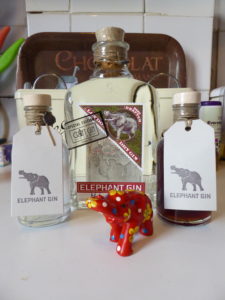 The large bottle has some lovely decoration (we all know I’m a sucker for a good label) and string wrapped around the bottle neck. It gives a feel of something old that has been shipped to us, helped by old world postage stamp designs and a map of Southern Africa. No wax seal to break through here (thank god), just a simple cork top. First sniff is fairly pungent. I can’t work out what the smell is – but this is probably from the rare African botanicals they use (Devil’s Claw, Lion’s Tails or Buchu anyone?). Straight away the smell packs a punch in the glass, but the taste is less intense than anticipated. It’s certainly got flavour to it. But I have no idea what that flavour is. Not sweet, the gin falls more on the savoury side with an almost herby smell (after tasting it I checked out the botanical list, Mountain Pine, that will be the one). A small amount of heat is noticeable on your tongue – ginger is one of the botanicals. It goes down very easily straight (never a good sign for my liver).
The large bottle has some lovely decoration (we all know I’m a sucker for a good label) and string wrapped around the bottle neck. It gives a feel of something old that has been shipped to us, helped by old world postage stamp designs and a map of Southern Africa. No wax seal to break through here (thank god), just a simple cork top. First sniff is fairly pungent. I can’t work out what the smell is – but this is probably from the rare African botanicals they use (Devil’s Claw, Lion’s Tails or Buchu anyone?). Straight away the smell packs a punch in the glass, but the taste is less intense than anticipated. It’s certainly got flavour to it. But I have no idea what that flavour is. Not sweet, the gin falls more on the savoury side with an almost herby smell (after tasting it I checked out the botanical list, Mountain Pine, that will be the one). A small amount of heat is noticeable on your tongue – ginger is one of the botanicals. It goes down very easily straight (never a good sign for my liver).
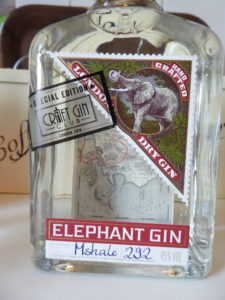 Mixed with tonic (and a small panic when I realise I am now out of tonic water) this is an absolute delight. Fresh apple flavours (but no disgusting fake sweetness) keep it light while heavier spiced tones make it deep and earthy. No burning sensation at any point – one could almost confuse it for exciting water. Different areas of the mouth come alive as you take a sip. At 45% I was expecting this to be harsher, but it is clean and simple in taste. I felt no need to add any lemon or lime to this gin. I happily sipped away at it all evening, and will continue to do so. I can’t wait to crack open their signature gin and the sloe gin.
Mixed with tonic (and a small panic when I realise I am now out of tonic water) this is an absolute delight. Fresh apple flavours (but no disgusting fake sweetness) keep it light while heavier spiced tones make it deep and earthy. No burning sensation at any point – one could almost confuse it for exciting water. Different areas of the mouth come alive as you take a sip. At 45% I was expecting this to be harsher, but it is clean and simple in taste. I felt no need to add any lemon or lime to this gin. I happily sipped away at it all evening, and will continue to do so. I can’t wait to crack open their signature gin and the sloe gin.
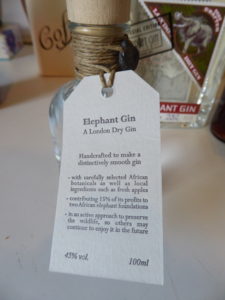 A 50cl bottle of the signature blend is available on Masters of Malt for just £29.49 (as of day of publishing). Absolute bargain. This will be on order the second this bottle is finished. Elephant Gin are all over social media on Twitter, Facebook and Instagram.
A 50cl bottle of the signature blend is available on Masters of Malt for just £29.49 (as of day of publishing). Absolute bargain. This will be on order the second this bottle is finished. Elephant Gin are all over social media on Twitter, Facebook and Instagram.
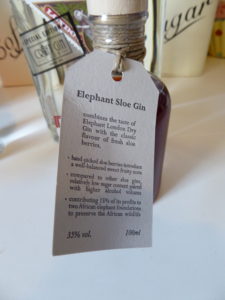 Don’t forget to check out Craft Gin Club and congratulate them on their success in Dragon’s Den – welcome on board Sarah Willingham! They’re on Twitter, Facebook and Instagram as well.
Don’t forget to check out Craft Gin Club and congratulate them on their success in Dragon’s Den – welcome on board Sarah Willingham! They’re on Twitter, Facebook and Instagram as well.
Finally, give me a follow on Twitter and Instagram and let me know what you think!